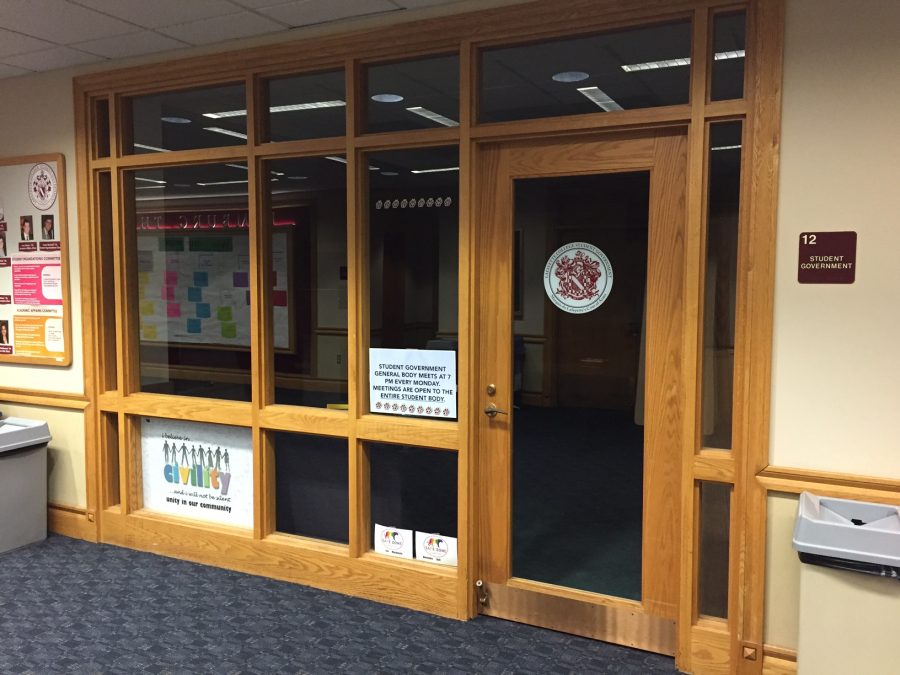Before the Ad Hoc Committee on Ensuring Inclusive Dialogue had their first meeting, students and committee members met to find common ground on concerns about the group’s purpose and the effect it will have on students of marginalized groups on campus.
The ad hoc committee is made up of eight students who are tasked with comprising a report to present to the college about how to ensure all political opinions are heard on campus.
Student government President Bilal Akbar ’18 said that one of the purposes of forming the committee is to “break the monotony” of liberal events on campus. The members of the committee were selected by Akbar and committee chair Michael Latorre ’18.
A main concern mentioned at the meeting was whether the committee’s composition was representative of the student body. Of the nine members, eight are male and one is female. Akbar said two of the members are students of color, including himself.
“That’s on-the-spot reflective of the proportion of the student body that are people of color,” Akbar said.
Akbar also recognized the gender ratio is not representative of the student body but this could not be avoided in forming the committee. He said the applicant pool for joining was four males to every female.
Student government member and student who brought concerns to the meeting Pascual Ventura ‘19 said that the composition of the committee wasn’t talked about enough among student government.
“Have we looked at the socio-economic backgrounds of the students? Have we looked at where do they come from, what parts of the country? I don’t think we have,” he said. “I don’t think that the discussion of this committee being formed was discussed enough, it had to be discussed more. But I was met with, ‘It has been discussed enough.’”
Akbar said he felt the discussion between the three parties was intense and created an atmosphere different from usual student government meetings.
“It certainly lacked the decorum that student government meetings have,” he said, “and I understand that perhaps these students are not part of leadership groups that have proper meeting structures where you’re called upon to talk instead of just talking over one another, which is what I saw a lot of.”
Former student government president L’Eunice Faust ‘17, who attended the meeting to outline her concerns, said that she and the other concerned students were being talked down to during the meeting.
“At certain points I just felt disrespected quite honestly,” Faust said. “I can’t sugar coat that.”
“I don’t understand how you’re part of a committee of inclusive dialogue, but when someone expresses a viewpoint that’s different than yours, your immediate reaction is to scoff at them or try to demean somebody by trying to explain to them the structure of student government,” she added, “as if some people in the room aren’t already intimately aware of how student government is structured and works.”
At one point during the meeting, Fayola Fair ’19 said she was laughed at by committee members when she said that racism was not a “deterrent” for those who decided to vote for President Donald Trump.
She also said she felt the way in which her questions were answered were “condescending.”
Latorre, however, said he didn’t feel that anyone had been disrespected during their meeting.
“I don’t think they were talked down to,” he said. “I’m genuinely sorry that they felt that way, and we didn’t mean to condescend. We didn’t mean to talk down to them. I feel like we didn’t.”
Overall, however, Faust felt the meeting was productive and brought to light possible misconceptions of the committee.
“Honestly the meeting was in one sense very productive because it was more clearly understood that this was actually going to be a committee that was helping to establish inclusive dialogue,” Faust said.
The students at the meeting with concerns were assured during the meeting that future committee gatherings would be open to the public. However, Akbar later said it won’t be entirely open.
“They aren’t technically closed, because there will be a rotation of groups of 2-3 people coming in to give their input, this is simply to ensure that students who do come in came give more direct input and be involved proactively,” he wrote in email.
“There will certainly be a channel for students to voice their concerns at the committee meeting and to attend them,” Latorre said.
Kathryn Kelly ’19 and William Gordon ’17 contributed reporting.





















































































































